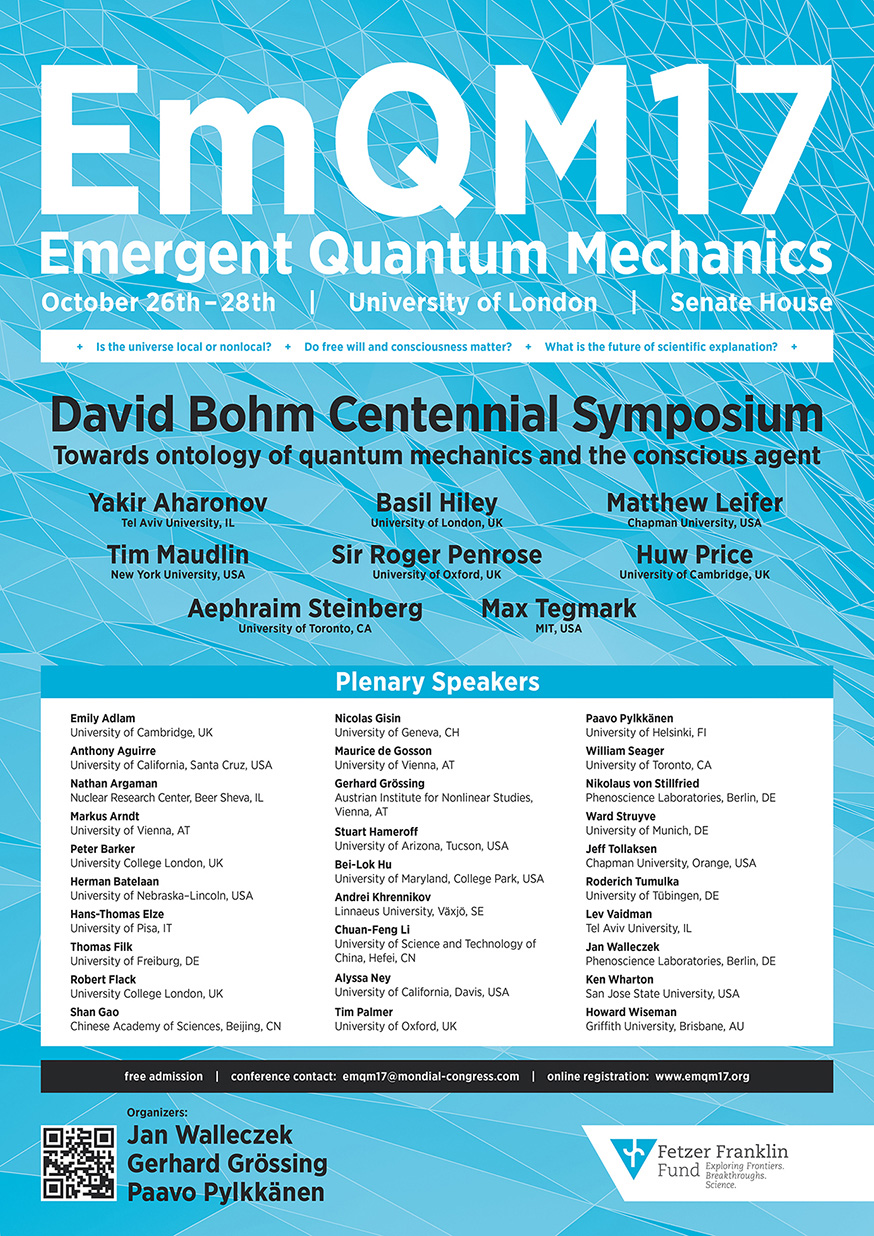WELCOME ADDRESS
Get more impressions with #emqm17 hashtag on Twitter
UPDATE:
July 30th: For the 32 articles in the Entropy special issue please click here.
April 17th 2018: You can watch all the speaker presentations at emqm17.org/presentations
December 22th 2017: Nearly all poster sessions are available at emqm17.org/poster-session
November 17th 2017: Over 600 photos are now available at emqm17.org/photo-gallery
October 12th 2017: The program is now available at emqm17.org/program
October 9th 2017: All abstracts are now available at emqm17.org/presentations
SYMPOSIUM PUBLICATION
An open-access special issue of Entropy titled “Emergent Quantum Mechanics – David Bohm Centennial Perspectives” invited original speaker contribution: This Special Issue explores the possibility of an ontology for quantum mechanics. The focus is the search for a “deeperlevel” theory for quantum mechanics that interconnects three fields of knowledge: emergence, the quantum, and information. Contributions will be featured that present current advances in realist approaches to quantum mechanics, including new experiments, work in quantum foundations, and the physics of the quantum observer and the conscious experimenter agent.
For the 32 articles in the Entropy special issue please click here.
SYMPOSIUM VENUE
University of London | Senate House | Beveridge Hall
KEYNOTE SPEAKERS
Yakir Aharonov (Tel Aviv) | Basil Hiley (London) | Matthew Leifer (Orange) | Tim Maudlin (New York) | Sir Roger Penrose (Oxford) | Huw Price (Cambridge) | Aephraim Steinberg (Toronto) | Max Tegmark (Boston)
INVITED SPEAKERS
Emily Adlam (Cambridge) | Anthony Aguirre (Santa Cruz) | Nathan Argaman (Beer Sheva) | Markus Arndt (Vienna) | Peter Barker (London) | Herman Batelaan (Lincoln) | Ana María Cetto (Ciudad de México) | Maurice De Gosson (Vienna) | Thomas Elze (Pisa) | Thomas Filk (Freiburg) | Robert Flack (London) | Shan Gao (Beijing) | Nicolas Gisin (Geneva) | Gerhard Grössing (Vienna) | Stuart Hameroff (Tuscon) | Bei-lok Hu (College Park) | Andrei Khrennikov (Växjö) | Chuan-Feng Li (Hefei) | Tim Palmer (Oxford) | Paavo Pylkkänen (Helsinki) | William Seager (Toronto) | Nikolaus von Stillfried (Berlin) | Ward Struyve (Munich) | Jeff Tollaksen (Orange) | Roderich Tumulka (Tübingen) | Lev Vaidman (Tel Aviv)| Jan Walleczek (Berlin) | Kenneth Wharton (San Jose) | Howard Wiseman (Brisbane)
ORGANIZERS
Jan Walleczek (Berlin) | Gerhard Grössing (Vienna) | Paavo Pylkkänen (Helsinki)
OBJECTIVES
The symposium explored the possibility of an ontology for quantum mechanics. The resurgence of interest in realist approaches to quantum mechanics, including deterministic and indeterministic ones, challenges the standard textbook view. In this effort, the symposium directed focus towards the following questions:
● Are quantum ontologies possible or impossible in view of relativity theory? How to avoid the possibility of causal or information paradoxes? How to interpret the non-signalling theorem?
● Is the universe local or nonlocal? What is the nature of the connection between two distant measurement observations that manifest EPR-type nonlocal correlations?
● Are nonlocal connections – e.g., “action-at-a-distance” – merely a mathematical construct as in the orthodox view, or are they nonlocal causal elements in a radically new conception of reality, e.g., „quantum causality“?
● Does ontological quantum theory call for a new understanding of temporal relations at the quantum level, including temporally indefinite, time-symmetric, or retro-causal effects from the future?
● What new experiments might yield breakthroughs towards answering the question of whether or not ontological approaches to quantum mechanics could ever be validated?
● What is the role of the experimenter agent/scientific observer in realist quantum mechanics? Do free will and consciousness matter? What is the role of agency, e.g., the ability to access and control informational events?
● What is the future of scientific explanation? Is scientific metaphysics, e.g., the notions of causality, reality, and physical influence, obsolete in mathematical or informational accounts of the quantum world?
● Why quantum emergence? What distinguishes weak emergence, e.g., supervenience, from strong emergence? What is the ontological status of epistemically-inaccessible quantum states?
● What is David Bohm’s legacy for the future of quantum physics? What is his contribution to philosophy and to scientific views of reality characterized by monism and a relational ontology?
On the occasion of David Bohm’s 100th birthday, these and related questions were addressed in search of a possible “deeper-level theory” for quantum mechanics that interconnects three fields of knowledge: emergence, the quantum, and information. The symposium offered an open forum for critically evaluating the prospects and significance – for 21st century physics – of ontological quantum mechanics, an approach which David Bohm helped pioneer. Contributions were invited that presented current advances in both standard as well as realist approaches to quantum mechanics, including new experiments, work in quantum foundations, and quantum philosophy.
SYMPOSIUM VENUE
 The symposium convened in Beveridge Hall at Senate House of the University of London.
The symposium convened in Beveridge Hall at Senate House of the University of London.
Senate House is located right next to Birkbeck College where David Bohm worked for several decades starting in the 1960s. 25 years ago to the day, at the time of the EmQM17 Symposium, David Bohm died on October 27, 1992.
LUNCH MEALS
GALA DINNER
A gala dinner was held after the conclusion of the symposium on the evening of October 28, 2017. Dinner was served in the Hall of Middle Temple which is one of the finest examples of an Elizabethan hall in the country with a double hammer beam roof carved from the oak of Windsor Forest and an elaborately carved screen made in 1574. Attendance of the gala dinner was by invitation only and required the presentation of a special ticket.




